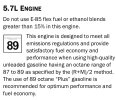RAM Patriot
Ram Guru
In an effort to discover why we are having issues with the exhaust manifold, wanted to conduct a survey and discussion to see if there is any correlation between the octane used and the heat produced by the engine to cause the exhaust manifolds to crack.
Here is some information that led to this discussion:
The higher the compression ratio, the higher the octane rating and higher ignition point needed to get a proper fuel burn. If you cheap out and use a lower octane rating than recommended, you'll notice knocking and pinging from the engine, which is the fuel detonating before the proper moment. Other than the noise and possible reduced power caused by using a lower-than-recommended octane rating, you'll risk overheating your engine if the uncontrolled detonation is too great. If your vehicle requires high octane fuel, you should use the fuel grade recommended by your manufacturer. Some drivers can use a lower octane fuel with no problems, but it's no guarantee that will happen with you and your vehicle.

Here is some information that led to this discussion:
The higher the compression ratio, the higher the octane rating and higher ignition point needed to get a proper fuel burn. If you cheap out and use a lower octane rating than recommended, you'll notice knocking and pinging from the engine, which is the fuel detonating before the proper moment. Other than the noise and possible reduced power caused by using a lower-than-recommended octane rating, you'll risk overheating your engine if the uncontrolled detonation is too great. If your vehicle requires high octane fuel, you should use the fuel grade recommended by your manufacturer. Some drivers can use a lower octane fuel with no problems, but it's no guarantee that will happen with you and your vehicle.












